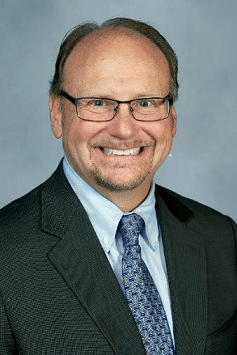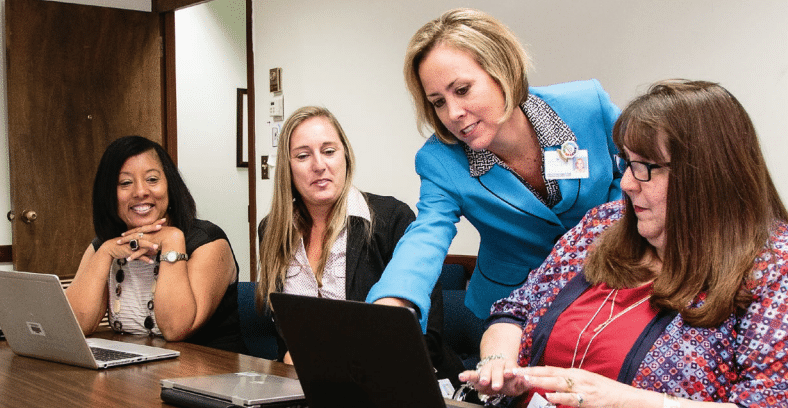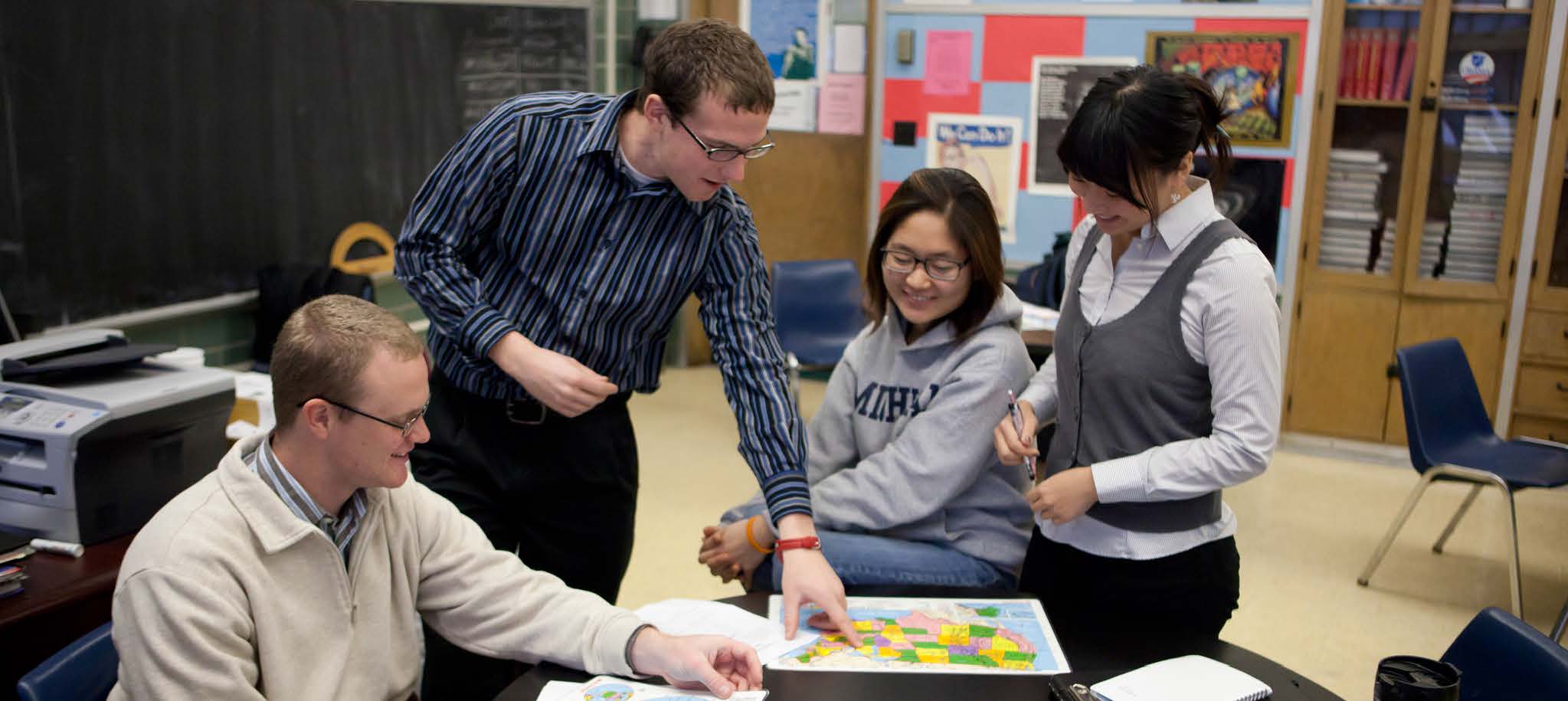18 Apr2019
By Matthew Wales
AACTE’s Leadership Academy is the perfect professional development opportunity for you to discover who you are as a leader. Designed for new and aspiring deans, department chairs, and anyone looking to develop or enhance their skills as an academic administrator, the academy covers the essentials of leadership while helping attendees cultivate a supportive network of peers. Here’s what the newest member of AACTE’s Academy Faculty, John Kuykendall had to say about his experience, including being a previous Academy participant:
 What do you feel is the most valuable reason for attending the Leadership Academy?
What do you feel is the most valuable reason for attending the Leadership Academy?
For new administrators, it is essential to know that you are not alone in your role. I consider it necessary to develop a support group around your new leadership position and to have colleagues to call upon for guidance and assistance. The sessions at AACTE’s Leadership Academy provided me with key awareness in the decision-making process and leadership practices and strategies. My experience with the Academy was essential in developing a confident start in my new role as a dean for a school of education.
18 Apr2019
By Meghan Grenda

Help AACTE keep you informed on developments that impact educator preparation. Update your member profile! Our online process makes it easy and fast—just visit aacte.org to access the AACTE Profile Manager.
The AACTE Profile Manager allows us retrieve the most accurate member information to deliver the content and communications you’ll find most valuable. The Profile Manager allows you to edit your contact information, select your research areas of expertise, view any outstanding orders, and manage your subscriptions. An updated profile also provides us the opportunity to customize information specific to your member needs.
18 Apr2019
By Kim Metcalf
 How often have you said (or thought to yourself), “I can’t possibly take on any more responsibilities! I can barely keep my head above water now?”
How often have you said (or thought to yourself), “I can’t possibly take on any more responsibilities! I can barely keep my head above water now?”
As I write to encourage you to serve on the AACTE Board of Directors and standing committees, I’m acutely aware that concerns about time and commitments exist for each of you. Given that we all struggle to balance our professional and personal lives, why should we commit time for service to AACTE? As someone who manages to serve on the Board of Directors—and who is now the chair—let me offer a few reasons why I find service to AACTE worth the investment of time and talent.
- It is important. Our institutions prepare students for the most important profession in the world. Yet, we are regularly reminded that policy makers and political leaders, the members of our communities, and sometimes even our colleagues in the academy don’t fully value the breadth or impact of our work. AACTE, through our collective voice, is both a vehicle and a resource for highlighting the value and importance of high-quality, university-based educator preparation. Being actively engaged in the work of AACTE has provide me with opportunities to influence the national conversation about educator preparation, helped me be better aware of developments beyond my institution, and provided tools and materials by which to more effectively communicate to my own regional and state audiences.
17 Apr2019
By Joanne Arhar

The Longview Foundation invites teacher educators to apply for the 2019-2020 cohort of the Global Teacher Education Fellows (GTE) Program. The GTE Fellows Program offers virtual professional development for select U. S. teacher educators to design Global Learning Classrooms for their teacher candidates. Program participants will receive professional development that includes a series of webinars led by experts in global learning and the support of a mentor with expertise in global learning in teacher education.
The GTE Fellows Program is seeking applicants who are
- Committed to global learning
Engaged with a full time teaching load during the 2019-2020 academic year, which includes at least two teacher education courses in an initial teacher preparation program
Supported by their respective dean/department chair to revise and teach at least one teacher education course that incorporates global learning outcomes, assessments, content, technology, and pedagogical practices that foster global competence in K-12 learners.
Interested candidates should apply for the Global Teacher Education Fellows Program by May 1.
12 Apr2019
By Denise Pearson

Historically black colleges and universities (HBCUs) and other minority-serving institutions (MSIs) are uniquely positioned to engage higher education policymakers, researchers, practitioners, and other stakeholders to increase the participation of males of color throughout the teacher pipeline. To that end, Project Pipeline Repair: Restoring Minority Male Participation and Persistence in Educator Preparation Programs is a three-year, research-based initiative that emphasizes cross-sector collaboration as foundational to addressing three interconnected problems: nationwide teacher shortages, the lack of teacher diversity, and the teaching profession narrative.
On October 2-5, 2019, the State Higher Education Executive Officers Association (SHEEO) will host the Project Pipeline Repair Summit that will bring together P-16 policy, institutional, and community leaders to culminate this collaboration between state agencies, HBCUs, and partnering school districts in four states (Arkansas, Louisiana, Mississippi, and South Carolina). During the Summit, we will engage in deep conversations with higher education policy and practice experts, including educator preparation researchers and practitioners. Representatives from other MSIs and organizations with similar aims are welcomed, and will also be present to expand the learning and build capacity in these important policy and practice areas.
12 Apr2019
By Jane E. West
This blog post is written by AACTE consultant Jane West and is intended to provide update information. The views expressed in this post do not necessarily reflect the views of AACTE.
Congress was busy this week trying to wrap a few things up as they enter an extended recess period. With the timeline for the election pressing, the momentum will continue. Remember the first Democratic presidential candidate debate is in June—just two months away! So the pressure is on.
- House Makes Magic Move on Budget!
The Budget Control Act, as it stands now, would require dramatic cuts for education and other programs for FY 2020, which begins October 1. In order to avoid significant cuts to education and other programs, the Budget Control Act needs to be amended to increase the spending caps. While the House Budget Committee adopted new spending caps this week, Democrats were unable to find consensus and bring that provision to the House floor.
But do not despair! Where there is a will there is a way! On Wednesday the House adopted something called a “deeming resolution” which provides for $1.3 trillion for the 12 spending bills in FY 2020. The “non-defense discretionary” portion (which includes education) will be $34 billion over the FY 2019 spending level. This deeming resolution paves the way for Appropriations Chair, Rep. Nita Lowey (D-NY), to divvy up the funding into 12 pots—one for each of the appropriations bills.
12 Apr2019
By Brandon R.T. Frost

Research indicates that effective school leadership is associated with better outcomes for students and schools. A high-quality school leader affects their teachers and students for many years. School districts are also instrumental in affecting teacher and student outcomes by playing a pivotal role in supporting their school leaders.
The Wallace Foundation partnered with six large and urban school districts across the nation to study the effects of Principal Pipelines from 2011 to 2016. The purpose was to examine whether a comprehensive principal pipeline would be more effective than business-as-usual approaches to the preparation and management of school leaders. The term, principal pipeline, encompasses the following components: 1) leader standards that guide all pipeline activities, 2) preservice preparation opportunities for assistant principals and principals, 3) selective hiring and placement, and 4) on-the-job induction, evaluation, and support. School districts were also required to produce and implement systems to further develop and sustain the principal pipeline outside of the study’s original time frame.
12 Apr2019
By JTE Insider

Check out the latest JTE Insider blog interview by the Journal of Teacher Education (JTE) editorial team. This blog is available to the public, and AACTE members have free access to the articles in the JTE online archives—just log in with your AACTE profile.
This author interview features Servet Altan’s insights from the article “Using Habits of Mind, Intelligent Behaviors, and Educational Theories to Create a Conceptual Framework for Developing Effective Teaching Disposition.” Altan co-authored the article with Jennie F. Lane, and Erskine Dottin. This article was published in the March/April 2019 issue of the Journal of Teacher Education.
Q1: What motivated you to pursue this particular research topic?
I have always admired talented teachers. Being a K-12 teacher myself, I have had the chance to work with a variety of teachers from different backgrounds and varying degrees of experience. I have always wondered what makes effective educators think and act the way they do. Furthermore, I was curious whether there are certain experiences that could help pre-service teachers develop desired characteristics. A responsibility of mine is teacher education and one of the aims of professional development is to understand teachers’ ways of knowing and acting. Additionally, it is worthwhile to know how these ways of knowing and acting reflect themselves in a teacher’s practice.
11 Apr2019
By Katrina Norfleet

TeachingWorks at the University of Michigan is presenting its second annual Practice-Based Teacher Education Workshop, an opportunity for teacher educators to examine and try out practice-based teacher education pedagogies. The workshop, will take place on July 8-10, 2019 at the University of Michigan School of Education, in Ann Arbor, Michigan.
The presentations will include artifacts of practice such as videos and transcripts to create more time for teacher educators to practice teacher education pedagogies.
11 Apr2019
By Ken Futernick
 Those who prepare future generations of classroom teachers are well-positioned to promote equity, inclusion, and social justice, but in doing so they must address two significant challenges.
Those who prepare future generations of classroom teachers are well-positioned to promote equity, inclusion, and social justice, but in doing so they must address two significant challenges.
First, they must adopt targeted recruitment strategies to ensure that all PK-12 schools have adequate pools of new teachers from which to choose. This, along with equally important efforts within the PK-12 community to reduce turnover of existing teachers, will eliminate the persistent shortages of well-qualified teachers that deprive many students, especially the most vulnerable ones, of a quality education. In addition to boosting enrollments, teacher educators must also ensure that their candidates resemble the demographics of the PK-12 students they will teach. Over time, this will close the widening diversity gap that exists between students and their teachers in many of the nation’s public schools. As research has shown, this will help close the achievement gap, reduce high school dropout rates, and lead more students to pursue college degrees.[1]
11 Apr2019
By Linda Minor

Every year, AACTE’s Washington Week attracts attendees from all over the nation. “Your Voice Matters” is this year’s theme and will feature three events:
The State Leaders Institute, June 2-3, is for current leaders of AACTE’s state chapters. This program is the forum to discuss important trends in state policies related to educator preparation. Attendees interact with other leaders from across the United States, learning strategies and collaborating to increase their state chapters’ capacity and advocate for the profession.
The Holmes Scholars Summer Policy Institute, June 3, is for current AACTE Holmes Doctoral Scholars. This allows attendees to have an insider experience in the world of education policy. Students will learn about the implications of current policy on research and programming that focus on minority populations.
05 Apr2019
By Katrina Norfleet

In a recent podcast interview for JTE Insider blog, author Dan Goldhaber from the University of Washington offers an overview of his article, Evidence-Based Teacher Preparation: Policy Context and What We Know, during a talk with Graduate Assistant Mary Neville. The article was published in the March/April 2019 issue of the Journal of Teacher Education.
Goldhaber shares that the article is intended to do two thing: Describe what is known about teacher education and what happens once a teacher candidate becomes an in-service teacher, and secondly, to make observations about some of the structures that might be needed for state teacher preparation programs to learn more about what constitutes effective teaching.
05 Apr2019
By Brandon R.T. Frost

AACTE identified and documented two exemplary teacher preparation programs that ensure all of their candidates are ready to work with all students, including students with disabilities. We are pleased to feature a set of videos from each program documenting how they implement curriculum for dual certification (general education and special education) and feature extensive clinical preparation.
Bowling Green State University’s undergraduate Inclusive Early Childhood Program and Portland State University’s Secondary Dual Education Program support new and beginning teachers in teaching in inclusive classrooms. Both programs lead to certifications in general and special education. “These institutions ensure that all educators have the skills to work with students with disabilities in the 21st century,” said AACTE Consultant Jane West, “School districts scramble to hire these outstanding students, as they come with the mindset and the skillset to be effective with all students.”
05 Apr2019
By Matthew Wales

Are you ready to take the next step in your academic career, but uncertain where to begin? Learn what it takes to be an effective and authentic administrator and advocate during AACTE’s Leadership Academy this summer. Register today for this premier educator preparation training in Pittsburgh, PA, June 23-27.
In just the first 24 hours of AACTE’s Leadership Academy, you will
- Explore the concept of who you are as a leader.
- Examine who it is you may lead, and how you effectively lead them.
- Identify elements of leadership that are critical to your current or aspirational academic leadership position.
- Practice the concepts learned in a unique, hands-on simulation that will put your newly-acquired skills to the test.
05 Apr2019
By Deborah Koolbeck

The U.S. Department of Education has released its Notice of Inviting Applications for the Fiscal Year 2019 Teacher Quality Partnership (TQP) Grants in the Federal Register. TQP is the only federal initiative dedicated to strengthening and transforming educator preparation at institutions of higher education and to meet the workforce needs of high need school districts and schools.
 What do you feel is the most valuable reason for attending the Leadership Academy?
What do you feel is the most valuable reason for attending the Leadership Academy?


 How often have you said (or thought to yourself), “I can’t possibly take on any more responsibilities! I can barely keep my head above water now?”
How often have you said (or thought to yourself), “I can’t possibly take on any more responsibilities! I can barely keep my head above water now?” 




 Those who prepare future generations of classroom teachers are well-positioned to promote equity, inclusion, and social justice, but in doing so they must address two significant challenges.
Those who prepare future generations of classroom teachers are well-positioned to promote equity, inclusion, and social justice, but in doing so they must address two significant challenges.



